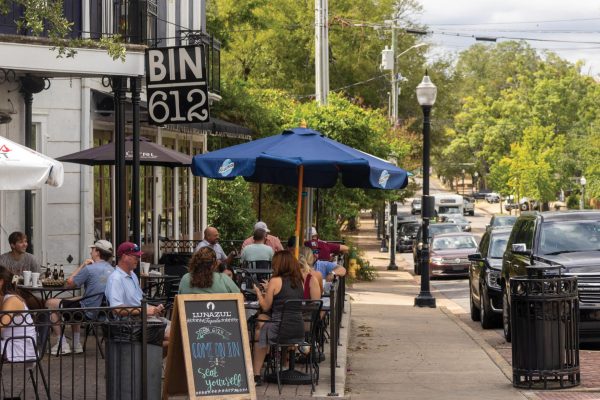This summer, Moe’s Original BBQ in downtown Starkville shut its doors, a casualty of rising costs that are forcing local restaurants to rethink how they do business. As the price of goods rises in the economy, the restaurant industry has to reshape its practices to adapt to inflation.
Inflation is difficult to navigate within an industry that is dependent on consumer business, like the restaurant industry. To mitigate rising production costs, restaurants have to raise prices, but this risks turning away customers.
Brian Blank, a researcher and professor of economics and finance at Mississippi State University, described the ties between inflation, restaurant costs and menu pricing.
“In this recent trend, when inflation has risen so rapidly, there were two things that people talked a lot about as potential drivers of that inflation, one of which is supply chains. So when supply chains are snarled, we see these costs rise,” Blank said. “But raising prices is challenging in those types of instances and likely to turn away customers.”
In addition to the changing economy, local businesses are hard to maintain due to competition and a lack of consumerism. Blank explained what it takes for a small restaurant to succeed.
“But unfortunately, one of the challenges with new businesses is that they’re more likely to close than more established businesses,” Blank said. “In particular, restaurants, around 80% shut down within the first five years, and that’s a difficult challenge, not only in Starkville, but elsewhere.”
Despite the current economic climate, Blank has faith in the stability of the Starkville economy and described it as resilient.
“The recent economic environment with high inflation has created more challenges for restaurants than it would have if, say, the economy was stronger and inflation was lower, but that said, Starkville has probably seen as many new restaurants open as it has seen close,” Blank said. “I think that’s evidence that the local economy may not be suffering as much as in places that don’t have a growing city that’s accompanying a growing university
Zachary’s, a popular restaurant in Columbus, Mississippi, has been able to successfully manage inflation over the years and developed strategies to navigate rising costs. Dow Ford, long-time general manager at Zachary’s, shared his experience with inflation while working in the industry, starting with the cost of supplies.
“Obviously, because groceries are more expensive for the average person, they’re more expensive at the wholesale level as well,” Ford said. “So at some point, if they continue to go up, you have to make a decision as to whether or not you’re going to either raise the price and possibly drive customers away, or drop the item from the menu.”
Ford said specific ingredients like bacon bits and shrimp have increased in price for Zachary’s in recent years. However, Ford observed that one menu item’s high price was the most impactful.
“Chicken wings, which is one of our more proper products, went up 300%. That’s one of the examples where we had to raise the price of that product because we couldn’t get it, we couldn’t just stop serving them, so we raised the price. We actually went up about $5 per order,” Ford said.
“If an appetizer item becomes the most expensive item on your menu, psychologically, it’s not it’s not a good look for you. So we had concerns all over the place. Now, fortunately for us, the people flinch for about a month, and then after that, because the food and service is so good and consistent, they’re willing to pay for it.”

Ford said the consumers are now more likely to buy the item as an entree rather than an appetizer followed by another meal. He believes the key to success in these instances relies on how a restaurant communicates with its customers.
“The reason restaurant people preach consistency is that people come in whether they have a particular item that they like or whether they’re working their way through the menu. They have an expectation, and they know what they’re going to get,” Ford said. “And that simple change, no matter what it was, in the interest of trying to minimize an expense, that simple change can turn people away.”
In the wake of an inflation crisis, consumers are no strangers to the struggles that come with it. Connor Coleman, a master’s student at MSU and a five-year server at local restaurants, described how inflation has affected him as a consumer.
“You know, on the money that I make to eat out and being a server myself, I know that that’s, you know, what people rely on for their living. I can’t not tip well. And tipping well, on top of the cost of food is quite expensive,” Coleman said. “As far as my spending habits, even when I’m doing that, like I used to not stress over, you know, what to drink? I would just get a Diet Coke or a sweet tea. But now I just, like a lot of other people, I’m just getting water to drink when I go to a restaurant because I know they’re not going to charge me for that.”
Restaurants could be directly affected by consumers’ shrinking budgets. Coleman explained how the Starkville community can ultimately prevent that outcome.
“The restaurant industry is a service industry, and it depends on the whims of other people to know if it’s going to do well or not,” Coleman said. “But I think as long as people work it into their budget to indulge themselves, or they want to have a good time, I think the industry will be just fine.”


















































































Brent Robinson • Sep 18, 2024 at 6:52 am
Great piece of journalism. However, an unexplored aspect is the huge rise in labor cost. A lot of consumers can see rising food cost because they go to the grocery store weekly, however- it’s harder for them to comprehend the booming cost of having their food prepared.